九年级上册unit6知识总结
人教版九年级上册英语unit6知识点

人教版九年级上册英语unit6知识点九年级上册英语Unit6知识点回顾在九年级上册英语中,Unit6是一个重要的单元,主要涉及到时间的表达和询问,并且包括几个重要的语法结构。
本文将对这些知识点进行回顾,并探讨如何运用这些知识点来提高英语水平。
1. 时间的表达在Unit6中,我们学习了几种表示时间的方法。
首先是使用基数词表示具体的日期,例如:July 1st。
另一种方法是使用序数词表示星期几,例如:Monday。
在具体的时间表达上,我们可以使用24小时制,也可以使用12小时制。
例如:9:30表示上午9点30分,而15:45表示下午3点45分。
此外,我们还学习了表示频率的表达方式,包括always、usually、often、sometimes、seldom和never等。
这些词汇可以帮助我们描述我们日常的活动和习惯。
2. 时间的询问在英语中,询问时间是一个常见的场景。
在Unit6中,我们学习了几种方式来询问时间。
最常见的方式是问"What time is it?",这是一个简单而直接的方式。
当然,我们还可以使用更为复杂的方式来询问,例如:"What's the time now?"或者"What time do you have?"。
这些方式在日常交流中也是常见的。
3. 一般现在时和现在进行时在Unit6中,我们学习了一般现在时和现在进行时两种时态。
一般现在时用于叙述客观事实和常规习惯,例如:"I go to school every day.";现在进行时则用于表示正在进行的动作,例如:"She is watching TV right now."这两种时态在日常英语中非常常见,掌握它们的用法对于提高口语表达能力至关重要。
4. 发表意见和建议在Unit6中,我们还学习了一些表达意见和建议的句子。
九年级全册Unit 6单元知识总结
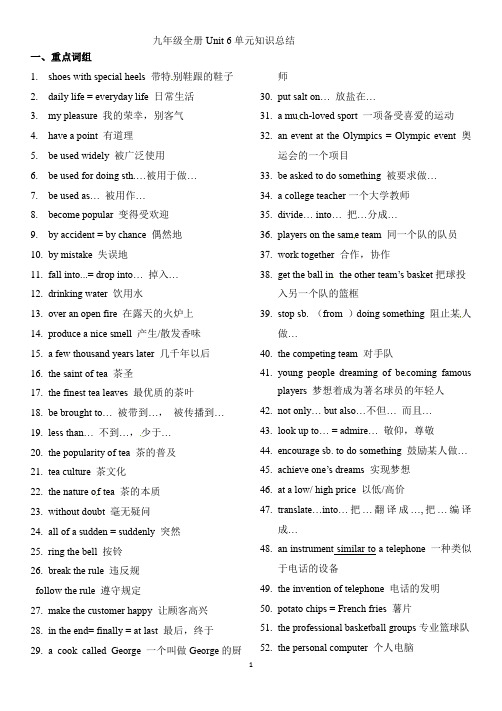
九年级全册Unit 6单元知识总结一、重点词组1.shoes with special heels 带特别鞋跟的鞋子2.daily life = everyday life 日常生活3.my pleasure 我的荣幸,别客气4.have a point 有道理5.be used widely 被广泛使用6.be used for doing sth.…被用于做…7.be used as… 被用作…8.become popular 变得受欢迎9.by accident = by chance 偶然地10.by mistake 失误地11.fall into...= drop into… 掉入…12.drinking water 饮用水13.over an open fire 在露天的火炉上14.produce a nice smell 产生/散发香味15.a few thousand years later 几千年以后16.the saint of tea 茶圣17.the finest tea leaves 最优质的茶叶18.be brought to… 被带到…,被传播到…19.less than… 不到…,少于…20.the popularity of tea 茶的普及21.tea culture 茶文化22.the nature of tea 茶的本质23.without doubt 毫无疑问24.all of a sudden = suddenly 突然25.ring the bell 按铃26.break the rule 违反规follow the rule 遵守规定27.make the customer happy 让顾客高兴28.in the end= finally = at last 最后,终于29.a cook called George 一个叫做George的厨师30.put salt on… 放盐在…31.a mu ch-loved sport 一项备受喜爱的运动32.an event at the Olympics = Olympic event 奥运会的一个项目33.be asked to do something 被要求做…34.a college teacher一个大学教师35.divide… into… 把…分成…36.players on the same team 同一个队的队员37.work together 合作,协作38.get the ball in the other team’s basket把球投入另一个队的篮框39.stop sb. (from )doing something 阻止某人做…40.the competing team 对手队41.young people dreaming of be coming famousplayers 梦想着成为著名球员的年轻人42.not only… but also…不但… 而且…43.look up to… = admire… 敬仰,尊敬44.encourage sb. to do something 鼓励某人做…45.achieve one’s dreams 实现梦想46.at a low/ high price 以低/高价47.translate…into…把…翻译成…,把…编译成…48.an instrument similar to a telephone 一种类似于电话的设备49.the invention of telephone 电话的发明50.potato chips = French fries 薯片51.the professional basketball groups专业篮球队52.the personal computer 个人电脑53.someone else’s idea 另外的人的主意54.lead to … 导致,引起55.It is said that 据说It is believed that人们相信It’s reported that据报道It’s known that 众所周知二、重点语法句式---When was the zipper invented? --- It was invented in 1893.---Who was it invented by? --- It was invented by Whitcomb Judson.---What is the hot ice-cream scoop used for? --- It’s used for serving really cold ice-cream.Unit6基础复习熟记本单元单词、短语、句型;2. 语法复习:过去时的被动语态。
九年级英语上册Unit6重点词组总结

九年级英语上册Unit6重点词组总结Unit61.dancetothemusic跟着音乐跳舞IlikethemusicthatIcandanceto.2.prefer=likebetter更喜欢;⑴prefersth更喜欢…;Iprefersummertowinter.和冬季相比我更喜欢夏季.Iprefermusicthathasgreatlyrics.我更喜欢有抒情词句的音乐.⑵preferdoingtodoing…与…相比更喜欢…;Ipreferswimmingtoskating.与滑冰相比我更喜欢游泳.⑶prefertodoratherthando宁可/宁愿…而不…Iprefertodierathersteal.我宁死也不愿偷窃.Iprefertostayhomeratherthangoouttoplay.我宁可呆在家里也不愿出去玩。
⑷preferdoing/todosth更喜欢做某事Iprefersinging/tosing.我喜欢唱歌。
3.quietandgentlemusic轻柔的音乐4.remind“提醒;使记起,使想起”:⑴remind+ofsth/sb;⑵remind+that从句;⑶remindsb.ofsth.Thepicturesremindmeofmyschooldays.这些照片使我想起了我的学生时代.ThemusicremindsmeofBraziliandancemusic.⑷remindsb.that+宾语从句Iremindhimthathemustgohomebeforedark.我提醒他天黑前必须回家.⑸remindsb.todosth.canyouremindmetowakemeupat6o’clock?5.动名词作宾语句型:enjoydoing喜欢做;finishdoing 做完;giveupdoing放弃做;practicedoing练习做;minddoing介意做;missdoing错过做;feellikedoing想要做6.alongwith和…一道,连同…一起IlovemusicthatIcansingalongwith.我喜欢能够一起唱歌的音乐.7.call的用法:IlikethecDcalledHeartStrings.ThisistheboycalledTom.Theboycalledmary.wecancallhimXiaoming.8.whatdoyouthinkof…?你认为…怎么样?---whatdoyouthinkofit?---Ienjoyitalot.9.nextdoorneighbor隔壁邻居10.therebesbdoingTheremustbesomethingvisitingthehomesinourneighborho od.一定有什么东西在拜访我们小区里的家园。
人教版九年级全一册英语Unit6重点语法知识点总结

人教版九年级全一册英语Unit6重点语法知识点总结Unit 6 When was it invented?Section A(1a~2d)_必记单词ⅢⅢ1. heel n.鞋跟;足跟【例句】His heel is raw because his shoe does not fit well. 因鞋子不合适,他的脚后跟擦破皮了。
2. scoop n. 勺;铲子【例句】He used a scoop to scrve the ice cream. 他用铲子来吃冰激凌。
3. electricity n.电;电能【例句】While I was cooking supper, the electricity went off.我正在做晚饭时停电了。
【联想】electrical adj.电的,与电有关的4. style n.样式;款式【例句】The style of this skirt is just in season.这条裙子的款式正当时令。
【搭配】out of style 过时的|| in style 流行;时髦地5. project n.项目;工程【例句】The project is proceeding as planned. 工程正在按计划进行。
【联想】projection n.设计;规划;放映6. pleasure n.高兴;愉快【例句】He didn't show any pleasure when I offered to go withhim.我提出和他一起去,他并没有表示出高兴的样子。
【搭配】pleasure in... 以……为荣‖with pleasure 乐意效劳It's a /my pleasure.不客气。
【注意】pleasure 多用作不可数名词,当做“快乐的事,乐事”解时用作可数名词。
7. zipper n.(=zip) 拉链;拉【例句】The zipper is red.这条拉链是红色的。
九年级上册英语unit6知识点归纳

九年级上册英语unit6知识点归纳在九年级上册的英语教材中,unit6是一个关于旅行的单元。
本单元主要涉及旅行的话题,探索不同国家和文化的差异,以及与旅行有关的必备知识和技巧。
在这篇文章中,我们将对unit6的知识点进行归纳和总结,帮助同学们更好地理解和掌握这些内容。
句型和语法:本单元中,我们学习了许多关于旅行的常用句型和语法结构。
比如,在询问或描述旅行计划时,我们可以使用以下句型:1. Are you planning to visit any famous landmarks?你计划参观一些著名的地标吗?2. I'm going to visit the Great Wall next week.下周我打算去参观长城。
3. Have you ever been to the Eiffel Tower?你去过埃菲尔铁塔吗?除了这些常见句型外,本单元还涉及到了被动语态、宾语从句以及时间状语从句等语法结构。
例如:1. The hotel was built last year.这家酒店是去年建的。
(被动语态)2. My friend told me that he would go to Japan.我朋友告诉我他将去日本。
(宾语从句)3. After I finish my exams, I will go on a trip.我考试结束后,我会去旅行。
(时间状语从句)这些语法结构对于准确表达和理解旅行计划以及与他人交谈都非常重要,同学们要多做练习以加深对这些结构的理解和应用。
相关词汇和短语:在unit6中,我们还学习了许多与旅行有关的重要词汇和短语,这些词汇和短语不仅可以帮助我们进行旅行计划的讨论,也可以用于描述旅行体验和感受。
一些常用的词汇和短语包括:1. tourist attractions旅游景点2. cultural differences文化差异3. local cuisine当地美食4. souvenir纪念品在我们进行英语口语交流时,运用这些词汇和短语可以让我们的表达更加准确和流利。
人教版九年级英语全一册知识点Unit6知识点总结
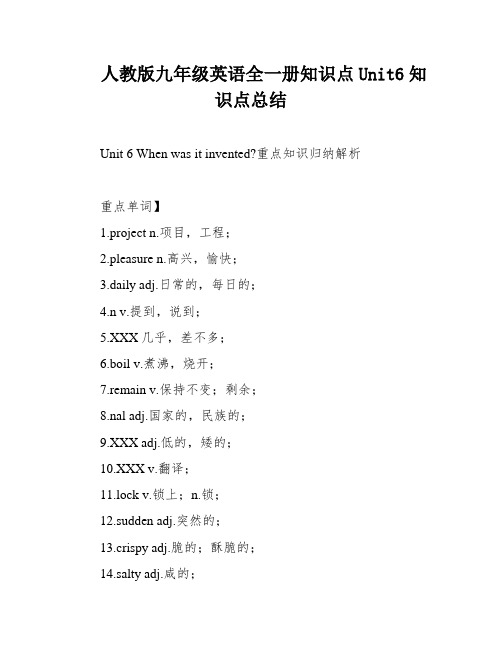
人教版九年级英语全一册知识点Unit6知识点总结Unit 6 When was it invented?重点知识归纳解析重点单词】1.project n.项目,工程;2.pleasure n.高兴,愉快;3.daily adj.日常的,每日的;4.n v.提到,说到;5.XXX几乎,差不多;6.boil v.煮沸,烧开;7.remain v.保持不变;剩余;8.nal adj.国家的,民族的;9.XXX adj.低的,矮的;10.XXX v.翻译;11.lock v.锁上;n.锁;12.sudden adj.突然的;13.crispy adj.脆的;酥脆的;14.salty adj.咸的;15.sour adj.酸的,有酸味的;16.customer n.顾客;17.Canadian adj.加拿大的;18.divide v.分开,分散;19.heron n.英雄,男主角;20.nal adj.职业的,专业的;重点词组】1.shoes with special heels 特殊后跟的鞋子2.hot ice cream scoop 热的冰其淋勺子3.run on electricity 电动的4.be used for 被用作5.the subject for my school project 学校项目的课题6.our daily lives 我们的日常生活7.have a point 有点道理8.XXX 偶然,意外地9.over the open fire 在火堆上10.fall into the water 落入水中11.take place 发生12.without doubt 毫无疑问13.at a low price 以一个很低的价格14.XXX the book into different languages 把书翻译成不同种的语言15.all of a sudden 突然16.by XXX 错误地17.a much-loved and active sport 一个深受喜爱并且积极的运动18.divide…into 把…分开19.sb from doing sth 阻止某人做某事20.look up to 钦佩,仰慕21.XXX XXX22.Borrowing someone else's idea1.In my n。
牛津译林版九年级英语上册Unit-6重点单词短语句子总结

牛津译林版九年级英语上册Unit 6 重点单词短语句子(1)侦探(2)杀人犯(3)嫌疑犯(4)职业(5)售货员(6)中等的(7)冷酷的(8)奖金、报酬(9)门口(10)证实(11)要某处(12)特别(13)流血(过去分词)(14)死(动/名/形)(15)搏斗(16)明显地(17)攻击者(18)聪明的(19)工程师(20)补充(21)指纹(22)敌人(23)收入高的(24)有罪的(25)犯罪(26)指控(27)几个(28)系统(29)认为(30)呼吸(31)沉重的(32)证明(33)反对(34)犯罪的/罪犯(35)小偷(单/复) (36)安全(名形副) (37)是否(2) (38)抢劫/抢劫者(39)熟悉的(40)记录(41)监狱(42)物品、反对(43)进步(44)钻石(45)震惊的(46)珠宝(47)老板(48)百万富翁(49)规划(50)怀疑(1)穿好衣服/装扮/给某自己穿衣服(2)严重得多(3)丢失,不见了(4)中等身材(5)做出很好的斗争(6)这工程师的死(7)检查现场寻找指纹及别的线索(8)用某号码联系某人(9)带给他一些敌人(10)做违反法律的某些事(11)对做…感兴趣(12)被杀的危险(13)张贴嫌疑犯的照片(14)注意某人做某事(15)排除等候(16)解决这个案子(17)对……熟悉(18)没有犯罪记录(19)因偷窃而入狱(20)杀人被捕(21)被卷入犯罪案(22)犯过。
罪(23)流血而死(24)呼吸沉重(25)到目前为止(26)不寻常的某事(27)在10月28的早晨(28)与。
相处的很好(29)导致…….;导向……(30)在他妹妹的婚礼上(31)在犯罪现场/时刻(32)一份报酬丰厚的工作(33)打斗的迹象用(34)小刀攻击某人1、最有可能是杀人犯的是1号嫌疑犯。
2、下午七点他被看见离开他的办公室。
3、他被一把小刀攻击结果流血而死。
4、受害人过去有电脑罪行。
5、过去的一年中他被指控进入了几家计算机系统。
英语九年级上册unit 6单元知识点总结
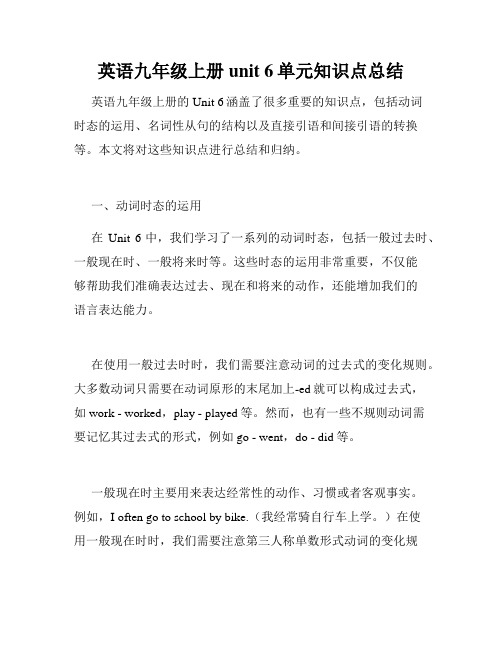
英语九年级上册unit 6单元知识点总结英语九年级上册的Unit 6涵盖了很多重要的知识点,包括动词时态的运用、名词性从句的结构以及直接引语和间接引语的转换等。
本文将对这些知识点进行总结和归纳。
一、动词时态的运用在Unit 6中,我们学习了一系列的动词时态,包括一般过去时、一般现在时、一般将来时等。
这些时态的运用非常重要,不仅能够帮助我们准确表达过去、现在和将来的动作,还能增加我们的语言表达能力。
在使用一般过去时时,我们需要注意动词的过去式的变化规则。
大多数动词只需要在动词原形的末尾加上-ed就可以构成过去式,如work - worked,play - played等。
然而,也有一些不规则动词需要记忆其过去式的形式,例如go - went,do - did等。
一般现在时主要用来表达经常性的动作、习惯或者客观事实。
例如,I often go to school by bike.(我经常骑自行车上学。
)在使用一般现在时时,我们需要注意第三人称单数形式动词的变化规则,即在动词原形的末尾加上-s或者-es,如run - runs,watch - watches等。
一般将来时由助动词will和动词原形构成,主要用来表示将要发生的动作或者计划中的事情。
例如,I will visit my grandparents tomorrow.(我明天要去看望我的祖父母。
)在使用一般将来时时,我们还需要注意其他一些表示将来的词语,如tomorrow(明天)、next week(下周)等。
二、名词性从句的结构名词性从句是一个由连接词(引导词)引导的句子,起名词的作用。
在Unit 6中,我们学习了几种常用的引导词,如that, what, who, which等。
名词性从句可以用作主语、宾语、表语或者补足语。
例如,What he said surprised me.(他说的话让我感到惊讶。
)在这个例句中,名词性从句“What he said”作为宾语出现。
人教版英语九年级上册unit6知识点总结

人教版英语九年级上册unit6知识点总结九年级上册英语 Unit 6 知识点总结英语学习中的一个重要环节是掌握基础知识。
在九年级上册的英语课程中,Unit 6 是学习重点之一。
本文将对 Unit 6 的知识点进行总结,帮助同学们更好地掌握和理解课程内容。
本单元主要学习了环保的话题。
首先是学习了一些有关环保的词汇,如“recycle”(回收利用)、“reuse”(再利用)和“reduce”(减少)等。
接着学习了一些有关环境问题的短语,如“throw away rubbish”(扔垃圾)、“save energy”(节约能源)和“plant trees”(种树)等。
这些词汇和短语在日常生活中非常常见,通过学习它们,同学们可以更好地表达自己对环保的看法和采取行动。
除了词汇和短语,本单元还学习了一些语法知识。
其中一项重要的内容是表示数量和复数的规则。
在英语中,名词的复数形式一般在词尾加上“-s”或“-es”。
此外,还有一些不规则的复数形式,如“child”(复数形式为“children”)和“man”(复数形式为“men”)。
要正确使用名词的复数形式,同学们需要记住这些规则和不规则规律。
另一个重要的语法知识点是情态动词的用法。
情态动词包括can、could、may、might、shall、should、will、would、must 和ought to 等。
它们可以用来表示能力、可能性、义务和推测等。
在句子中,情态动词通常用来帮助表达情感、态度和推测,因此在使用时要根据语境和意义来选择正确的情态动词。
本单元还涉及到了一些阅读和写作技巧。
在阅读方面,同学们学习了如何从文章中获取关键信息,如主题、中心思想和细节等。
同时,通过阅读理解不同类型的文章,同学们还可以提高自己的阅读理解能力。
在写作方面,同学们学习了如何用英语写一封感谢信和一篇环保宣言。
写作时要注意使用合适的语言和句式,以及运用所学到的词汇和短语,使文章更具表达力和说服力。
人教版九年级全一册英语Unit6单元语法知识点总结
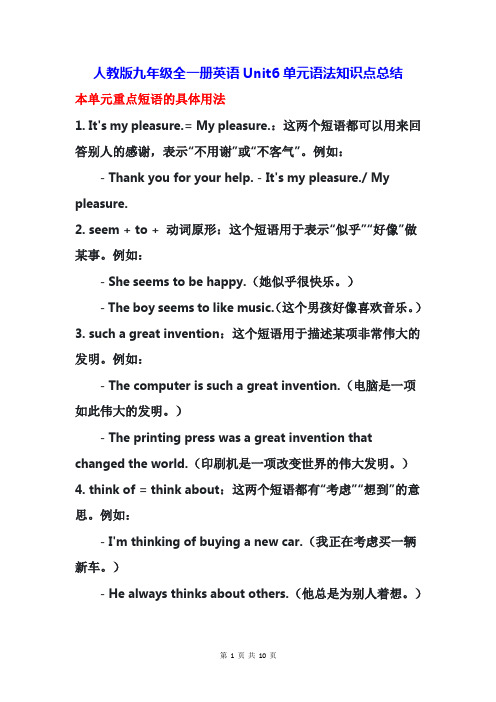
人教版九年级全一册英语Unit6单元语法知识点总结本单元重点短语的具体用法1. It's my pleasure.= My pleasure.:这两个短语都可以用来回答别人的感谢,表示“不用谢”或“不客气”。
例如:- Thank you for your help. - It's my pleasure./ My pleasure.2. seem + to + 动词原形:这个短语用于表示“似乎”“好像”做某事。
例如:- She seems to be happy.(她似乎很快乐。
)- The boy seems to like music.(这个男孩好像喜欢音乐。
)3. such a great invention:这个短语用于描述某项非常伟大的发明。
例如:- The computer is such a great invention.(电脑是一项如此伟大的发明。
)- The printing press was a great invention that changed the world.(印刷机是一项改变世界的伟大发明。
)4. think of = think about:这两个短语都有“考虑”“想到”的意思。
例如:- I'm thinking of buying a new car.(我正在考虑买一辆新车。
)- He always thinks about others.(他总是为别人着想。
)5. in our daily lives/ in my daily life:这两个短语用于描述在日常生活中的情况或活动。
例如:- Technology plays an important role in our daily lives.(科技在我们的日常生活中起着重要的作用。
)- In my daily life, I like to read books and exercise.(在我的日常生活中,我喜欢读书和锻炼。
Unit 6 When was it invented?九年级英语全一册同步必背知识清单(人教版)
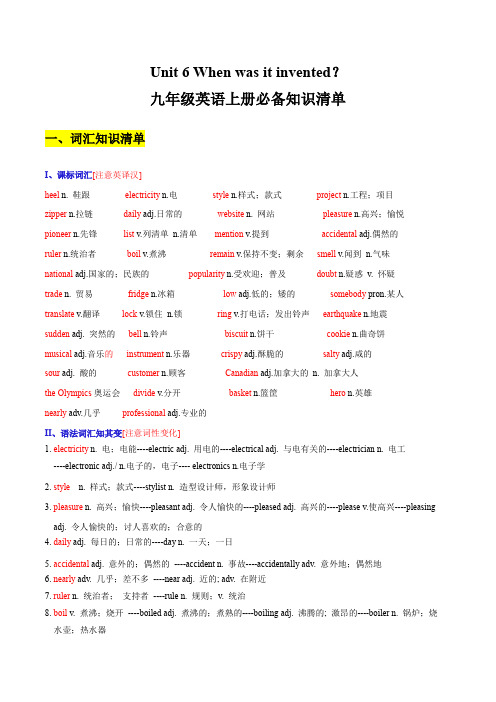
Unit 6 When was it invented?九年级英语上册必备知识清单一、词汇知识清单I、课标词汇[注意英译汉]heel n. 鞋跟electricity n.电style n.样式;款式project n.工程;项目zipper n.拉链daily adj.日常的website n. 网站pleasure n.高兴;愉悦pioneer n.先锋list v.列清单n.清单mention v.提到accidental adj.偶然的ruler n.统治者boil v.煮沸remain v.保持不变;剩余smell v.闻到n.气味national adj.国家的;民族的popularity n.受欢迎;普及doubt n.疑惑v. 怀疑trade n. 贸易fridge n.冰箱low adj.低的;矮的somebody pron.某人translate v.翻译lock v.锁住n.锁ring v.打电话;发出铃声earthquake n.地震sudden adj. 突然的bell n.铃声biscuit n.饼干cookie n.曲奇饼musical adj.音乐的instrument n.乐器crispy adj.酥脆的salty adj.咸的sour adj. 酸的customer n.顾客Canadian adj.加拿大的n. 加拿大人the Olympics奥运会divide v.分开basket n.篮筐hero n.英雄nearly adv.几乎professional adj.专业的II、语法词汇知其变[注意词性变化]1. electricity n. 电;电能----electric adj. 用电的----electrical adj. 与电有关的----electrician n. 电工----electronic adj./ n.电子的,电子---- electronics n.电子学2. style n. 样式;款式----stylist n. 造型设计师,形象设计师3. pleasure n. 高兴;愉快----pleasant adj. 令人愉快的----pleased adj. 高兴的----please v.使高兴----pleasing adj. 令人愉快的;讨人喜欢的;合意的4. daily adj. 每日的;日常的----day n. 一天;一日5. accidental adj. 意外的;偶然的----accident n. 事故----accidentally adv. 意外地;偶然地6. nearly adv. 几乎;差不多----near adj. 近的; adv. 在附近7. ruler n. 统治者;支持者----rule n. 规则;v. 统治8. boil v. 煮沸;烧开----boiled adj. 煮沸的;煮熟的----boiling adj. 沸腾的; 激昂的----boiler n. 锅炉;烧水壶;热水器9. remain v. 保持不变;剩余----remaining adj. 剩下的;剩余的10. smell n. 气味v. 发出……气味;闻到----smelly adj. 有臭味的;发臭的11. national adj. 国家的;民族的----nation n. 国家;民族----international adj. 国际的---nationality n. 国家,国籍;民族12. doubt n. 疑惑;疑问v. 怀疑----doubtful adj. 可疑的;令人生疑的----doubtless =----undoubted adj. 无疑的;确定的----doubtlessly=---undoubtedly无疑地;确实地13. low低的;矮的----lower adj. 下方的;在底部的14. translate v. 翻译----translation n. 翻译----translator n. 翻译家15. lock v. 锁上;锁住n. 锁---locker n.可锁存物柜;存放室;存放柜;锁具---unlock v. 开启16. sudden adj.突然(的)----suddenly adv. 突然地17. musical adj.音乐的;有音乐天赋的----music n. 音乐----musician n.音乐家18. salty adj.咸的----salt n.盐----saltless adj. 无盐的;无味的19. sour adj. 酸的;有酸味的----sourish adj. 微酸的20. Canadian adj.加拿大的;加拿大人的n.加拿大人----Canada n. 加拿大21. popularity n. 受欢迎;普及----popular adj. 普遍的;流行的----unpopular adj. 不流行的----popularly adv.流行地,通俗地;普及地,广泛地22. hero n. 英雄;男主角----heroine n. 女英雄----heroic adj. 英雄的;英勇的23. professional adj. 职业的;专业的----profession n. 职业;专业----professor n. 教授;教师III、重点短语知搭配[注意固定短语的英汉互译]1、be invented in+地点/时间被发明于某时某地be invented by sb由某人发明的2、shoes with adjustable heels 可调后跟的鞋3、change the style of sth 改变……的风格4、see in the dark 在黑暗中看路5、run on electricity电动的6、operate on sb 给某人动手术7、think of 想出,想到8、with pleasure乐意效劳9、such+(a/an)+形容词+名词如此……10、think about (doing) sth.考虑(做)某事11、be used for (doing) sth 被用来做某事be used by sb. 被谁使用be used as被当作……使用be used to do sth被用来做某事be/get used to (doing) sth.习惯做某事used to do sth 过去常做某事12、by accident=by chance 意外地,偶然地13、by mistake错误地make mistakes in sth 在某事上犯错mistake A for B错把……当成……14、in the end=finally=at last最后,终于at the end of…在……末,尽头by the end of在……末之前end up with 以……结束end up doing sth结束做某事15、形容词/副词+enough 足够的…… enough +名词足够的……16、seem to do sth似乎要做某事seem like +名词似乎象…seem that 从句似乎……17、for a long time 好长时间18、sprinkle A on B把……撒在……上19、not...until... 直到……才20、at that time 在那时21、over=more than 多于22、according to根据23、It’s said that从句据说……24、some time一些时间sometime 某时(将来)sometimes有时some times 几次25、boil drinking water烧开水26、over an open fire在户外篝火上in the open air在户外27、fall into 落入fall off 从……掉下来fall down跌倒fall over摔倒fall in love with 爱上28、make tea 沏茶29、It’s believed that从句人们认为……30、decide to do 决定作某事31、not...until... 直到……才……32、in this/that way 这/那样33、take place (意料之中)发生34、the popularity of... ……的普及35、without doubt 毫无疑问36、throw sth away把……扔掉throw sth to sb把某物扔给某人37、in the1950s在二十世纪五十年代38、prefer ….to….. 更喜欢39、at a low price 以低价40、steal...from...从……偷……41、translate...into...把……翻译成……42、notice sb do/doing 注意某人做过/正在做43、all of a sudden 突然,猛地44、make sb./sth. +形容词使……怎么样45、change...into...把……变成……46、in history 在历史上47、play indoors在室内玩48、stop...from...阻止……做某事49、on the same team 在同一个对50、the safety of ... ……的安全51、knock into sb撞到某人knock at/on the door敲门52、divide…into… 把……划分成53、the aim of ………的目的54、try to do sth 尽力做某事try doing sth. 尝试做某事55、get ... into ... 把……弄进……56、dream of/about 梦想做某事57、not only...but also... 不但……而且……(并列主语时,谓语的数由最近主语决定)58、the number of... ……的数量(做主语时,谓语用单数)a number of 许多……(做主语时,谓语用复数)59、look up to钦佩,羡慕60、encourage sb to do sth 鼓励某人做某事IV、核心单词知用法[注意固定短语、句型和词块]1.style n.样式;款式【短语】out of style过时的in style流行的2.pleasure n.高兴;愉悦的【拓展】pleasant adj. 令人愉快的,修饰事物pleased adj.感到高兴的,修饰人With pleasure.乐意效劳是对方提出请求,答应对方的用语,问句通常是“Could you please do....?”My pleasure.不用谢常用作别道谢时的客气回答。
九年级上册英语unit6知识点

九年级上册英语unit6知识点Unit 6: AdventuresIntroduction:In the ninth grade English textbook, Unit 6 explores the theme of adventures. This unit introduces various vocabulary, grammar, and language skills that will help students express and understand adventures. In this article, we will delve into the key knowledge points covered in Unit 6.1. Vocabulary:Vocabulary plays a crucial role in understanding any language. In Unit 6, students will encounter new words related to adventures. It becomes essential to grasp the meaning and usage of these words to enhance communication skills. Some essential vocabulary includes adventurous, trek, wander, explore, challenge, and many more. Students can practice using these words in sentences to strengthen their vocabulary.2. Grammar:Unit 6 also covers several important grammar points that will aid students in constructing sentences effectively. These grammar conceptsinclude modal verbs, comparatives, and superlatives, as well as the use of transitional phrases. Mastering modal verbs such as can, could, may, and might are crucial, as these help express possibilities and abilities. Comparative and superlative forms allow students to compare different adventures or describe the most exciting experiences. Understanding transitional phrases like "however," "in addition," and "therefore" will enhance coherence in writing and speaking.3. Listening Skills:Listening skills play a vital role in understanding spoken English. Unit 6 provides several listening exercises where students can develop their skills. Students will listen to dialogues and conversations related to adventures. They need to pay attention to specific information, grasp the main ideas, and understand the context. Regular practice of these listening exercises will improve comprehension and enable effective communication.4. Reading Skills:Reading is an essential component of language learning. In Unit 6, students will engage in reading activities that highlight adventure-related stories, articles, and passages. By reading these texts, students will enhance their reading comprehension skills and gain exposure to various sentence structures and writing styles. Additionally, studentswill learn to identify key information, make inferences, and understand the main ideas. They can also learn new phrases and sentence patterns by analyzing the texts.5. Writing Skills:Unit 6 provides ample opportunities for students to develop their writing skills. Students will be assigned tasks where they need to describe their adventures, either real or imaginary. They will practice organizing their thoughts, using appropriate vocabulary and grammar structures, and maintaining coherence in their writing. Tasks may include writing a journal entry, a story, or a travel brochure. Through these writing exercises, students will craft well-structured and engaging compositions.Conclusion:Unit 6 of the ninth-grade English textbook offers a comprehensive exploration of adventures. By focusing on vocabulary, grammar, listening skills, reading skills, and writing skills, students can develop a well-rounded understanding of this theme. Engaging with this unit will not only sharpen their language skills but also ignite their imagination and curiosity about the world of adventures.。
九年级英语上册Unit6重点词组总结
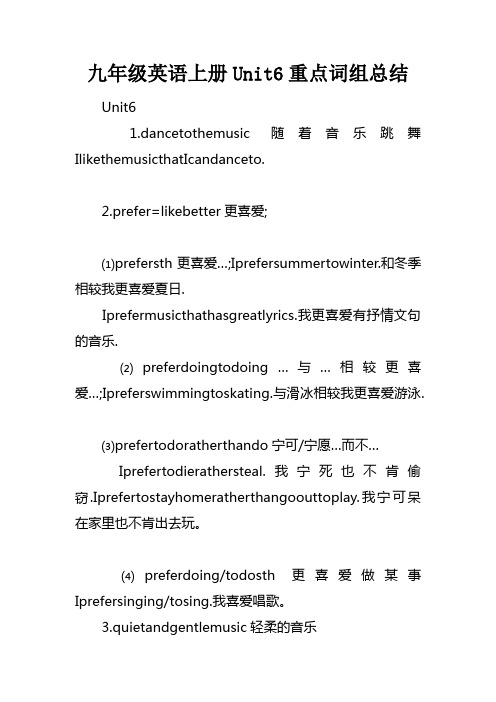
九年级英语上册Unit6重点词组总结Unit61.dancetothemusic随着音乐跳舞IlikethemusicthatIcandanceto.2.prefer=likebetter更喜爱;⑴prefersth更喜爱…;Iprefersummertowinter.和冬季相较我更喜爱夏日.Iprefermusicthathasgreatlyrics.我更喜爱有抒情文句的音乐.⑵preferdoingtodoing…与…相较更喜爱…;Ipreferswimmingtoskating.与滑冰相较我更喜爱游泳.⑶prefertodoratherthando宁可/宁愿…而不…Iprefertodierathersteal.我宁死也不肯偷窃.Iprefertostayhomeratherthangoouttoplay.我宁可呆在家里也不肯出去玩。
⑷preferdoing/todosth更喜爱做某事Iprefersinging/tosing.我喜爱唱歌。
3.quietandgentlemusic轻柔的音乐4.remind“提示;使记起,使想起”:⑴remind+ofsth/sb;⑵remind+that从句;⑶remindsb.ofsth.Thepicturesremindmeofmyschooldays.这些照片使我想起了我的学生时期.ThemusicremindsmeofBraziliandancemusic.⑷remindsb.that+宾语从句Iremindhimthathemustgohomebeforedark.我提示他天黑前必需回家.⑸remindsb.todosth.canyouremindmetowakemeupat6o’clock?5.动名词作宾语句型:enjoydoing喜爱做;finishdoing 做完;giveupdoing舍弃做;practicedoing练习做;minddoing介怀做;missdoing错过做;feellikedoing想要做6.alongwith和…一道,连同…一路IlovemusicthatIcansingalongwith.我喜爱能够一路唱歌的音乐.7.call的用法:IlikethecDcalledHeartStrings.ThisistheboycalledTom.Theboycalledmary.wecancallhimXiaoming.8.whatdoyouthinkof…?你以为…怎么样?---whatdoyouthinkofit?---Ienjoyitalot.9.nextdoorneighbor隔壁邻居10.therebesbdoingTheremustbesomethingvisitingthehomesinourneighb orhood.必然有什么东西在造访咱们小区里的家园。
九年级上册unit6知识点

九年级上册unit6知识点Unit 6 Knowledge Points for Grade 9In the ninth-grade curriculum, Unit 6 covers various knowledge points that are crucial for students to understand and master. This unit introduces new concepts, expands on previously learned topics, and provides a solid foundation for future learning. Let's explore the key points covered in Unit 6.1. Algebraic ExpressionsAlgebraic expressions are mathematical statements that include numbers, variables, and mathematical operations. Students learn to simplify expressions, combine like terms, and solve equations involving variables. This knowledge helps them solve real-life problems and lay the groundwork for more advanced algebraic concepts.2. Linear Equations and InequalitiesLinear equations involve variables raised to the power of 1 and have a constant ratio between variables. Students study methods such as the balance method and the substitution method to solve linear equations. They also learn about linear inequalities, which involveusing symbols like "<" and ">" to represent relationships between quantities.3. FunctionsFunctions are mathematical relationships that describe how two variables are related. Students explore linear and nonlinear functions, learn to read and interpret function notation, and graph functions on a coordinate plane. Understanding functions is essential for analyzing and modeling various real-life situations.4. Systems of EquationsA system of equations involves multiple equations with multiple variables. Students learn to solve systems of equations graphically, algebraically, and using matrices. This knowledge helps them tackle complex problem-solving tasks by representing multiple relationships simultaneously.5. Coordinate GeometryCoordinate geometry combines algebraic and geometric concepts. Students learn about the Cartesian coordinate system, graphing equations, finding the slope and distance between points, and solving geometric problems using coordinate geometry techniques.6. Statistical AnalysisUnit 6 introduces fundamental statistical concepts such as measures of central tendency (mean, median, mode), measures of dispersion (range, variance, standard deviation), and how to display data using histograms and box plots. These skills enable students to analyze and interpret data effectively.7. ProbabilityProbability is the study of chance and uncertainty. Students learn about the basic rules of probability, calculate probabilities of simple and compound events, and explore concepts such as mutually exclusive and independent events. Understanding probability enables students to make informed decisions based on likelihood.8. Pythagorean TheoremThe Pythagorean theorem relates to right triangles and states that the square of the hypotenuse (the side opposite the right angle) is equal to the sum of the squares of the other two sides. Students use this theorem to solve problems involving right triangles and apply it to real-world scenarios.9. Geometric TransformationsGeometric transformations involve changes in size, shape, or position of figures. Students study translations, reflections, rotations, and dilations. Understanding these concepts helps them analyze patterns, solve geometric problems, and explore symmetry and tessellations.In conclusion, Unit 6 of the ninth-grade curriculum covers a wide range of knowledge points in algebra, geometry, statistics, and probability. By understanding and mastering these concepts, students develop essential mathematical skills and problem-solving abilities that are crucial for their academic and real-life success.。
九年级英语知识点总结unit6

九年级英语知识点总结unit6九年级英语知识点总结-Unit 6九年级英语课程的第六单元涉及许多有趣和实用的知识点。
本文将总结这些知识点,并以一种深入而有趣的方式呈现出来。
1. 一般过去时态 (Simple Past Tense):一般过去时态用于表示过去发生的动作或状态。
动词的过去式是根据规则进行变化,例如:加 -ed 结尾、变元音等。
过去时态常和表示过去的时间状语连用,如:yesterday, last week, two days ago 等。
例句:I visited my grandparents last weekend.We watched a movie together yesterday.2. 不规则动词的过去式:不规则动词的过去式变化不按规则进行。
需记住这些不规则动词的过去式形式,如:go-went, see-saw, eat-ate。
这些动词在句子中使用时,不需要加 -ed 结尾。
例句:She went to the park with her friends.They ate delicious pizza for dinner last night.3. 过去进行时态 (Past Continuous Tense):过去进行时用于表示在过去某个时间段内正在进行的动作或事件。
使用过去进行时,主语 + be 动词 (was/were) + 现在分词 (-ing 形式)。
例句:He was playing soccer when it started to rain.They were studying English from 6 to 8 last night.4. 一般过去时与过去进行时的区别:一般过去时描述过去发生的具体事件,而过去进行时强调过去某个时间段内的连续性动作。
过去进行时常和 when, while 或 as 这样的连词连用。
例句:She called me while I was cooking dinner.When I was walking to school, I saw my friend.5. 被动语态 (Passive Voice):被动语态用于强调动作的承受者 (the receiver of the action),而不是动作的执行者 (the doer of the action)。
九年级英语上册Unit 6

Unit 6 When was it invented?【短语归纳】1. by accident 偶然地;意外地2. without doubt 毫无疑问的;的确3. by mistake 错误地;无意中4. look up to 钦佩;仰慕5. take place 发生;出现6. all of a sudden 突然;猛地7. divide…into… 把……分开8. the Olympics 奥林匹克运动会9. the style of ……的样式10. be used for 被用于……【单元知识点】1. invent v. 发明inventor n. 发明家invention n. 发明,可数名词2. be used for doing ,用来做…(是被动语态)(这个短语的考点有两点,一是used for的意思,二是for后面用动名词)Pens are used for writing. 笔是用来写的。
3. 给某人某样东西give sth. to sb.I gave a pen to him. 我给他一支笔。
give sb. sth.I gave him a pen. 我给他一支笔。
4. all day 整天5. salty adj. 咸的salt n. 盐6. by mistake 错误地(犯错是:make mistake,这些常见的短语大家务必要掌握)I took the umbrella by mistake. 我不小心拿错了雨伞。
7. make sb./sth+形容词:使…怎么样It made me happy. 它使我高兴make sb./sth+名词:让…做… It made me laugh. 它让我发笑8. by accident 意外,偶然(常见短语,考的最多的是它的意思)I met her by accident at bus stop. 我在公共汽车站意外地见到了她。
2024九年级英语上册Unit6必背知识点

2024九年级英语上册Unit6 When was itinvented?必背知识点针对2024年九年级英语上册Unit6 "When was it invented?"的必背知识点,可以归纳如下:一、重点短语1. It's my pleasure./ My pleasure. 我的荣幸。
2. seem+to+动词原形好像做某事。
3. such a great invention 如此伟大的一项发明。
4. think of = think about 想到,考虑。
5. in our daily lives/ in my daily life 在我们的日常生活中/在我的日常生活中。
6. have a point 有道理。
7. by accident 偶然地,意外地。
8. over an open fire 在篝火上。
9. It is said that 据说。
10. It is believed that 人们相信。
11. fall into = drop into 掉进……。
12. in the 19th century 在19世纪。
13. spread to other countries 传播到其他国家。
14. at a low price 以很低的价格。
15. bring sth. to sp. 把某物带到某处。
16. all of a sudden 突然地。
17. less than 少于,不到;more than = over 超过。
18. without doubt 毫无疑问。
19. at that time 在那时。
20. advise sb. (not) to do sth. 建议某人(不要)做某事。
21. start doing sth. 开始做某事。
22. work on sth. 致力于某事。
23. (be) similar to 与……相似。
24. the Olympics 奥运会。
- 1、下载文档前请自行甄别文档内容的完整性,平台不提供额外的编辑、内容补充、找答案等附加服务。
- 2、"仅部分预览"的文档,不可在线预览部分如存在完整性等问题,可反馈申请退款(可完整预览的文档不适用该条件!)。
- 3、如文档侵犯您的权益,请联系客服反馈,我们会尽快为您处理(人工客服工作时间:9:00-18:30)。
朝阳学校九年级英语学案教师:学生:日期:科目:英语时段:课题Unit 6知识点总结及练习学习目标考点分析1、掌握by的用法。
2、掌握本单元相关短语。
学习重点重点:掌握by的用法。
难点:掌握本单元相关短语。
学习方法分析、对比、归纳总结和练习相结合学习内容与过程1.prefer的用法:prefer v.更喜爱,更喜欢,相当于like……better,其过去式、过去分词为preferred,常用于以下结构:(1) prefer+名词、代词。
如:I preferred music. Which do you prefer?(2) prefer+动词不定式“宁愿干……”She prefers to live among the working people.(3) prefer + v-ing I prefer living abroad.常见的短语搭配有:①prefer……to……喜欢……而不喜欢……(to为介词)She prefers apples to bananas.②prefer doing to doing(to为介词)He prefers running to walking.③prefer to do …… rather than do sth.宁愿干……而不愿干……They prefer to play games rather than watch TV.2.短语remind …of的用法:Remind sb of sth使某人回想起或意识到某人、某事She reminded me of her sister.The pictures remind me of my school days.3.As的用法总结:①用作连词“按照”Please do it again as I told you.②连词,当……的时候,着重强调两个动词同时发生She sang as she worked.③③表示原因,“因为,由于”比较口语化,语气也较弱,所表示的原因比较明显。
As I didn’t know the way, I asked the policeman.④as…as… 和……一样(as…as中间放形容词和副词原级)She is as tall as me.4.Sure的用法Sure意为“确定,确认”常用结构有:be sure of +n. / pron. /短语相信,对……有把握be sure that 从句be sure to do 务必……一定……make sure 确保,核实,查收,弄清楚I am sure that you are right. 我相信你是对的。
Are you sure to close the door? 你确定关门了?5.one of the+最高级+复数名词意为“最……之一”是典型的adj/adv最高阶用法He is one of the most popular singers in the world.6.Interest的用法interest: ①n.兴趣,趣味;②v.使感兴趣He interested me in football.他使我对足球感兴趣。
I’ve got a lot of books that might interest you.我有许多可能使你感兴趣的书。
名词短语:take a interest in sth: 对……感兴趣相关词语及搭配:interested:adj 感兴趣的(修饰人)be interested in = take a interested in interesting: adj 令人感兴趣的(修饰物)【相关短语】expect to do sth.期望干……expect sb. to do sth期望某人干……catch up with追上,赶上take…to… 带……到……different kinds of music各种不同的音乐quiet and gentle songs轻柔的歌曲remind…of…使某人想起或意识到……over the years多年来her own songs她自己的歌曲be important to对……重要be sure to do sth.务必干……一定干……one of the best known Chinese photographers世界上最有名的中国摄影家之一on display= on show展览,展出come and go来来往往can’t stand不能忍受look for寻找feel sick感到恶心,不舒服to be honest说实话be lucky to do幸运的是……go for去找某人,想法得到某事物my six-month English course我6个月的英语课stay healthy保持健康French fries薯条stay away from与……保持距离be in agreement意见一致(后跟短语、句子)barbecued meat烤肉 a tag question反意疑问句课堂练习1. Bring the book _____ (who /which /when /where /it)I bought yesterday.2. The man to _____(who /whom /which /that /him )you just talked is our boss.3. The dictionary _____(who /which /when /where )cost me 150 yuan was stolen.4. That boy _____(he /who /which /whom /)is wearing a red jacket won the prize.5. I can do nothing _____(that /which /it /who) is helpful to you.6.我把妈妈给我买的那本书读完了。
7. I'll never forget the day _____ I was saved by a soldier.8.He prefers English _____ (than/to) Math.(同义句)→He _____ English _____ _____ Math.9. I prefer _____ (read)English _____ (write) English.10. In such a hot day, all of us preferred to stay at home rather than _____(go) out.11.She prefers comedies thrillers.(就划线部分提问)选择填空。
①remind of;②can't stand;③on display;④over the years;⑤wherever;⑥enjoy oneself;⑦to be hones t;⑧stay away from;⑨dance to;⑩smell(1)_____ you are,we must find you. (2)All the inventions _____ were invented hundreds of y ears ago. (3)_____,all has changed.(4)Don't forget _____ me _____ the time of the meeting.(5)I like light music that I can _____ gently.(6)What's this?It _____ terrible.I feel sick,take it away!(7)Barbecued meat tastes nice,but maybe it's bad for health.You'd better _____ it.(8)I don't like mice.I _____ them at all.(9)Did of them _____ during Jim's birthday party?(10)_____,I've smoked for many years.选择题:( ) 1. Though it was late , _____ he went on with his work .A. butB. andC. soD. /( ) 2. Some of her best loved photos are ___ display in this exhibition.A. onB. inC. atD. about( ) 3. There are many tall buildings on ____ sides of the street.A. eachB. everyC. bothD. either( ) 4. That is a watch is made in China.A. thatB. whoC. whomD. what( ) 5. “Help ____ to some fish.” Mrs. Smith said to the children.A. youB. yourselfC. yourselvesD. yours( ) 6. I dancing to singingA. likeB. enjoyC. loveD. prefer( ) 7. He has a friend who ____ the piano very well.A. playB. playingC. playsD. played( ) 8. We ____here two hours ago. We ____here for two hours.A. have arrived, have beenB. have come, have beenC. came, have comeD. arrived, have been( ) 9. I like music that I can dance____ .A. withB. toC. alongD. on( ) 10. We will have a _____ holiday after the exam .A. two monthB. two-monthC. two-monthsD. two months ( ) 11. LiuHuan is in China.A. one of the most famous musiciansB. one of most famous musiciansC. one of the most famous musicianD. one of the famousest musicians( ) 12. The song reminded my childhood.A. me toB. I toC. me ofD. I of( ) 13. Mom dislikes loud and fast music, ?A. do sheB. does sheC. don’t sheD. doesn’t she( ) 14. happens, I will support you.A. WhoB. WhatC. WhichD. Whatever( ) 15. When people want to relax themselves, they prefer TV rather than newspapers.A. watching; readB. watching; to readC. to watch; readD. to watch; reading( ) 16.Go down this street, the museum is just on your right. You can’t it.A. makeB. findC. missD. fail( ) 17.The beautiful girl came here yesterday is my best friend.A. whoB. whomC. whoseD. which( ) 18. Look at that handsome boy name is Steven.A. whoB. whomC. whoseD. which( ) 19.The trees Alice planted two years ago growing wellA. that; isB. that; areC. which; isD. what; are( ) 20.Jim dislikes people ______ talk much but never do anything.A. whomB. whenC. whoseD. who( ) 21.I hate people _______ talk much but do little.A. whomB. whoseC. whichD. who( ) 22.—Do you know the girl is from Canada?—Yes, her name is Helen.A. whomB. whichC. whoseD. who( ) 23.The young lady _____ we met yesterday is our new math teacher.A. whatB. whoseC. whomD. which( ) 24.Peter, there is someone would like to speak with you.A. whoB. whichC. whomD. that( ) 25.I like the teacher classes are very interesting and creative.A. whichB. whoC. whatD. whose( ) 26. — Do you know the boy _______ is playing soccer there?—Certainly. He is a friend of my ________.A. who; brother’sB. who; brotherC. whom; brother’sD. whose; brother( ) 27.—What kind of music do you like?—I like music __________ has great lyrics.A、whichB、whoC、whoseD、what( ) 28.The skirt _________ is made of silk is very expensive. I can’t afford it.A. thatB. whatC. /D. who( ) 29.—Is everything _____ we need to do _______?—Yes. You needn’t worry about it.A. which; has doneB. which; doingC. that; has doneD. that; done( ) 30.This is the very novel________ is written by GuoJingming.A. whoB. whatC. thatD. /( ) 31.I don’t know the teacher is talking with Miss Wang.A. whatB. whom C, which D. who( ) 32.—Do you know the boy _________ is sitting next to Peter?—Yes.He is Peter’s friend.They are celebrating this ______ birthday.A. who, ninthB. that, nineth C,/, nineth D. which, ninth( ) 33. The girl _________you talked about yesterday was our monitor(班长).A. whoB. whenC. whichD. whose( ) 34. Is that the man ______ helped us a lot after the earthquake(地震)?A. whoseB. whichC. whenD. who( ) 35. The whole world is fighting against the H1N1, a disease ______ has caused many deaths.A. whoB. whichC. whomD. what( ) 36. My mother feel tired, so we should help her with the housework.A. doB. doesC. hasD. have( ) 37. My sister likes music that she canA. sing itB. sing along with itC. sing alongD. sing along with ( )38. I hate people laugh at others when they make mistakes.A. whoB. whichC. whomD. whose39. I am reading the book. The book is about the science. (合并成一句)40. The movie is interesting. We saw a movie yesterday. (合并成一句)41. The people don’t study hard. The people won’t pass the exam. (合并成一句)42. The boy is my neighbor. I met him in the street two days ago. (合并成一句)43.I like swimming better than playing basketball. (改为同义句)44. Whatever you say, I won’t believe you. (改为同义句)家长签字:。
